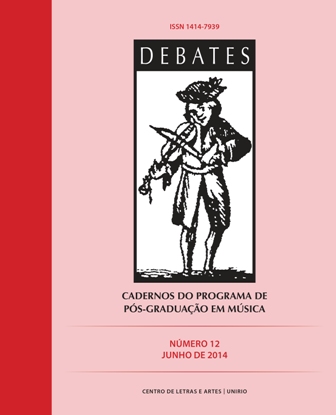Fado, Folclore e Canção de Protesto em Portugal: repolitização e (con)sentimento estético em contextos de ditadura e democracia
Resumo
Resumo: Este texto procura partilhar um trabalho de reflexão e de análise que tenho vindo a desenvolver desde 2007 sobre a música no quadro da pós-ditadura em Portugal. Tem vindo a ganhar forma pela pesquisa que entretanto tenho realizado, seja através da análise de documentação escrita, seja através de trabalho de campo, neste último caso junto de agrupamentos folclóricos e de cantautores portugueses que tiveram um particular protagonismo no processo revolucionário de 1974, que pôs fim à ditadura fascista. A minha reflexão centra-se na análise de dois universos musicais (conceito aqui entendido como uma constelação de ingredientes estilísticos, estéticos, contextuais e ideológicos associados à música), aparentemente distintos enquanto instrumentos políticos. O primeiro inclui o género musical fado e um repertório performativo designado genericamente por folclore, que foram, durante a ditadura do Estado Novo em Portugal (1933-1974), manifestamente instrumentalizados. O segundo refere-se a um tipo de canção nascida como reação ao regime fascista e que se transformou em símbolo da revolução. Como a sua designação não é consensual – como adiante explicarei - opto por nomeá-la genericamente como canção de protesto. A vinculação destes universos musicais a um passado política e socialmente repressor (no caso do fado e do folclore) e a um processo de luta anti-fascista e de educação para a democracia (no caso da canção de protesto) não impediu a sua sobrevivência após o fim da ditadura. Pelo contrário, os anos que se seguiram ao 25 de Abril de 1974 em Portugal, testemunham um crescimento exponencial de formação de novos agrupamentos de folclore (cerca de 300% durante a década de 1980), a transformação do fado num representante icónico do país enquanto património da humanidade (UNESCO, 2011) e a permanência da canção de protesto como repertório central de um país que é agora democrático. Procuro assim perceber de que modo estes dois universos musicais com histórias de vinculação política tão distintas, sobrevivem ao tempo, às ideologias e às políticas institucionais nos quais foram promovidos ou gerados.
Palavras-chave: Música. Ideologia. Repolitização. Inter(con)textualidade. Portugal.
Fado, Folklore and the Protest Song in Portugal: repolitization and (co)aesthetic feelings in the context of dictatorship and democracy
Susana Sardo
Departamento de Comunicação e Arte
Universidade de Aveiro
Abstract: This text seeks to share a work in progress and my thoughts about the symbolic place of some musical practices in the context of dictatorship and democracy in Portugal. It has been developed since 2007 through the analysis of historical documentation and fieldwork, in the latter case among the Portuguese folklore groups and some sing-songwriters who had a particular role in the revolutionary process that in 1974 ended the fascist dictatorship in Portugal. My reflection focuses on the analysis of two musical universes (a concept here understood as a constellation of stylistic, aesthetic, contextual and ideological ingredients associated with music), which were used, apparently, with distinct political roles. The first includes the performative genre Fado and a repertoire generally designated by Folklore, which were politicaly instrumentalized during the Estado Novo dictatorship (1933-1974). The second refers to a type of song, born as a reaction to the fascist regime, that has become a symbol of the revolution. As its name is not consensual - as I shall explain below - I choose to name it generically as Protest Song. The relationship of these two musical universes to a politically and socially repressive past (in the case of fado and folklore) and a process of anti-fascist struggle and education for democracy (in the case of protest song) did not prevent their survival after the end of the dictatorship. On the contrary, the years that followed the April 25 of 1974 in Portugal, witnessed an exponential growth of new folklore groups (about 300 % during the 1980s), the transformation of fado in an iconic representative of the country as heritage of humanity (UNESCO, 2011) and the permanence of the protest song as a central repertoire of a country that is now democratic. In this paper I will try to understand how these two musical universes, with so distinct political stories, survived to time, ideologies and institutional policies in which they were generated or promoted.
Keywords: Music. Ideology. Repolitization. Inter(con)textualization. Portugal


